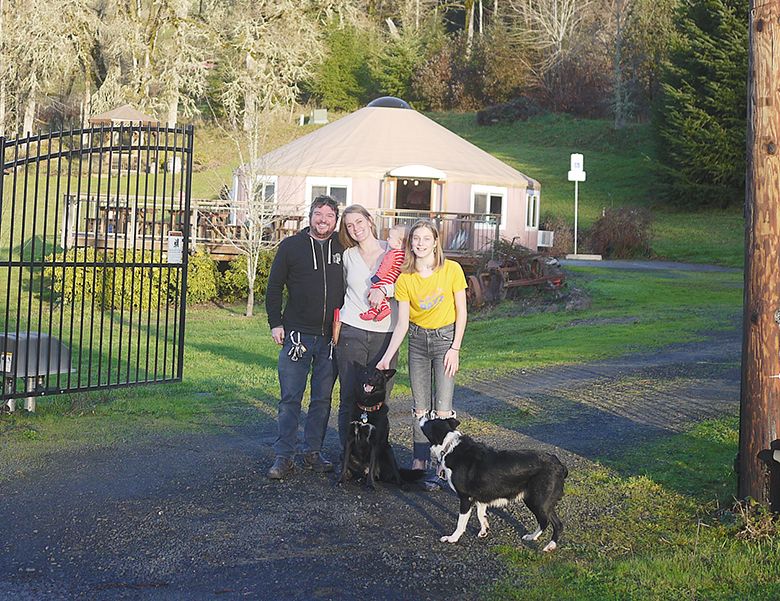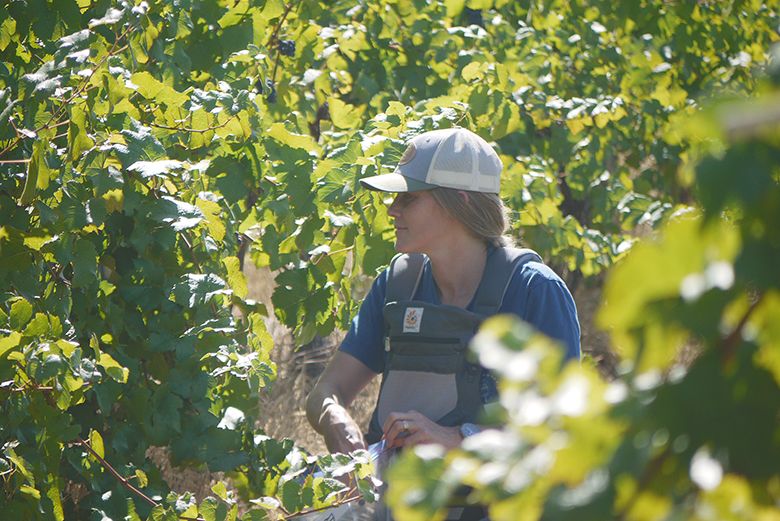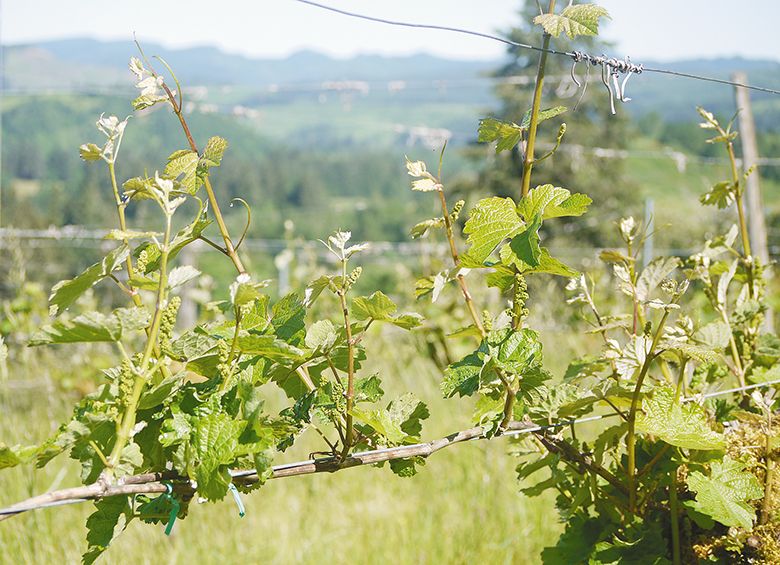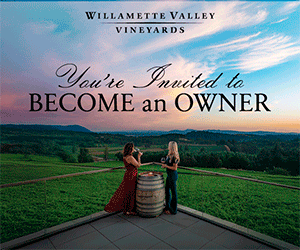Yurt in for a Treat
When visiting Elkton's Haines Creek Vineyard



By Aakanksha Argwal
The town of Elkton, Oregon, is easy to miss. An unassuming turn off the Umpqua River, past rolling hills and farmland, the town’s population barely tops 200. In this part of Douglas County, the wind shifts directions by the hour, the river mist lingers late into the morning, and the afternoon light softens the vineyard-draped hills.
For Mark Nicholl and Michelle Stephenson Nicholl, Elkton represents more than a quiet corner of Oregon’s wine country. It’s the future. Mark and Michelle never intended to own a vineyard. But in the spring of 2023, they found themselves walking the fence line of a forgotten property, tracing the overgrown contours of land that once had been farmed, abandoned and rediscovered.
“We walked up into the untamed ‘Top Shelf’ of the property,” Michelle remembers. “There was a steep hill, wild with Scotch broom and blackberries. You could see where the vineyard ended and the wilderness began. We looked at each other and just knew we had to leap.”
The property at Haines Creek includes a vineyard with 40-year-old vines. When it rains, a creek emerges. A squat yurt serves as a tasting room, where the scent of freshly baked baguettes mingles with the bright, lifted aromas of cool-climate Pinot Noir.
The Call of Elkton’s Cool Climate
For Mark, the path to Elkton began on the other side of the world. His formal education at the University of Adelaide started a journey working harvests in both hemispheres, learning the intricacies of each region’s winemaking techniques.
His first harvest took place in McLaren Vale, South Australia, an area known for its sun-drenched reds and old-vine Grenache. The moment that changed him didn’t occur in the winery, but rather on the drive to work.
“The sun was setting over the golden-brown hills; I’d had four hours of sleep, was suffering from a hangover and remember thinking, ‘This is the best job in the world.’” Mark recalls, “I knew then I needed to know everything about wine.”
That moment led him on a path across continents— California, Italy, France, Oregon, with each harvest increasing his understanding.
“After 25 years, over 30 vintages, working alongside some of the industry’s best grape growers and winemakers, I’ve learned one valuable lesson: there is always a new challenge with each harvest.”
Mark’s winemaking style evolved into what he calls a mélange of New and Old-World techniques, guided by a respect for the unique qualities inherent in each vineyard and season.
“My desire is to produce wines whose style and character reflect the fruit the vineyard and season have provided,” he remarks. “I am an avid foodie, a want-to-be-chef, so making food-friendly, balanced and cellar-worthy wines is important to me.”
In 2013, he opened the Oregon Wine LAB, an urban winery in Eugene. This departure from traditional winemaking, brings small-batch, artisan winemaking into a city setting. Visitors taste wine without setting foot in a vineyard. The LAB is where Mark and Michelle met. What began as a working relationship evolved into a partnership— in the cellar and life.
“The LAB is about creating a space where people can ask questions, taste what Oregon has to offer and enjoy learning about wine in a relaxed setting.”
Now, with Haines Creek Vineyards, Mark finds himself on the opposite side of the equation: tied to a specific piece of land, one vineyard, a single place.
“As a winemaker, every region you work leaves a mark on you. You carry forward everything you’ve learned— the way the French talk about terroir, how the Italians understand food and wine as being inseparable, the manner in which Australians embrace the sheer joy of winemaking. And, then you find a place where it all comes together,” he says.
For him, that place is here. But even Oregon is changing.
Elkton, however, feels different. Cooler, windier. The river draws afternoon breezes from the ocean not far beyond. A place where Pinot can still be what it’s intended to be— bright, structured, alive.
Mark’s discovery of Elkton was a result of the state’s changing wine scene. “Over the last decade and a half of working in Oregon, I have seen the effects of climate change on our wine. The style of Pinot that drew me to Oregon initially felt like it was slipping through our fingers,” he explains. But, as he became more familiar with Elkton’s vineyards and climate, he realized its immense potential. “Having some exposure to the cool-climate wines of the Elkton area, when a vineyard opportunity presented itself, the lightbulb came on to explore what the region has to offer.”
And yet, grapes weren’t the sole attraction. It was the sense of discovery. “Elkton is one of the last truly cool-climate frontiers for Oregon Pinot Noir,” he said. “I do believe it is a hidden gem in Oregon’s– and the world’s– vinous landscape.”
Elkton’s unique microclimate plays an essential role in shaping the wines. “Whilst technically a cool-climate site, the days are lovely and warm, with afternoon breezes flowing up the Umpqua River from the coast,” Mark expains. This cooling effect helps retain acidity while allowing for balanced flavor development. “This dance between warmth and coolness makes compelling wines.”
A Vineyard with Roots and a Future
First planted more than 40 years ago, the vines at Haines Creek Vineyard have witnessed generations of farmers, winemakers and caretakers pass through.
“The vines have history, a story we are still learning. Bit by bit, the Nicholls discover more, through conversations with local farmers and their descendants, tasting wines made from each block, studying the landscape, and by nurturing the vines each year, tasting the fruit and evolving our vineyard practices,” says Mark.
Their approach, deeply immersive, means they spend hours walking the vineyard, learning its nuances. “We fight over who gets to drive the tractor,” Michelle says. “We mend trellises, run picks, mow the vineyard and do as much as we possibly can together.”
Haines Creek, the vineyard’s namesake, extends beyond the North Block, its presence shaping the land. “In the rainy season, the hillside gurgles with springs and groundwater spilling down its slopes,” Michelle explains. The name transports you to a sense of place and time, in the hills outside of Elkton, on the benchlands above the Umpqua River.
Winemaking as a Conversation with the Land
Winemaking at Haines Creek is about balancing tradition with modernity, intervention with restraint.
“Our winemaking is a dance,” Mark observes, “drawing on our collective experience in modern and Old-World techniques while allowing the fruit to speak.”
Michelle, whose background is music, feels a natural connection between her artistic training and vineyard work. She is hands-on in the vineyard, pruning each vine, tending to the land with an intimacy industrial farming doesn’t allow.
“My years of studying music taught me tenacity and hard work, to strive for perfection,” she recalls. “Though I am new to this world of farming and winemaking, the work fascinates me. It is with this purpose and drive that I step out each day onto this land, into this work.”
Mark echoes this sentiment. “We’re not doing cartwheels in the winery,” he says. “The best wines make themselves. Our job is to not mess it up.”
Stewardship and Sustainability
Sustainability is at the core of Haines Creek’s winemaking philosophy. The Nicholls have committed to reducing their environmental impact at every stage of production.
“We are moving away from herbicide use entirely,” Michelle explains. “Every pass we take through the vineyard is intentional, using less machinery, further reducing our fossil fuel consumption. We then have more time observing and working in sync with the land.”
Their winemaking philosophy is not set in stone but evolves with each season. They tailor their vineyard management to the specific needs of each block. The Nicolls frequently question past practices and seek ways to be better stewards, not just of the vines, but also the soil, watershed and broader ecosystem sustaining their farm.
Their vineyard management revolves around soil health. “A thriving mycorrhizosphere is crucial,” Mark says. “We avoid unnecessary chemical interventions and focus on natural solutions to improve vine resilience.” They also tailor their irrigation practices carefully, capturing and using the natural springs emerging from the hills.
Beyond farming, their winery operations are designed with minimal waste. “We prioritize gentle, gravity-fed processing to reduce energy usage,” Mark explains. “Our cleaning practices use the least-harsh chemicals available and we are moving toward a closed-loop water system.”
Their enduring vision is even more ambitious— an entirely off-grid winery existing in harmony with the landscape. They imagine a facility powered by renewable energy, channeling natural resources to create a fully sustainable, symbiotic system seamlessly integrating the vineyard, winery and land itself.
Above their North Block, an overgrown area waits for restoration. “It was cleared many years ago and now sits full of Scotch broom, blackberries, and other invasive species,” Michelle notes. “We’re working to remove these and return the landscape to native plants, supporting the natural biodiversity that makes this a beautiful place to live and be.”
A Tasting Experience Like No Other
There is no grand winery at Haines Creek Vineyards, no tasting bar gleaming under chic lighting. Instead, there is a yurt. “I want our guests to feel at ease,” Michelle explains. “As though our patio is an extension of their home, a place to relax and unwind, to enjoy a glass and catch up with loved ones.”
Each morning, Michelle bakes baguettes from scratch, supplying guests a warm, homemade accompaniment to their wine tasting.
“The yurt is a place to share stories, to pick a tune on one of the many instruments and taste unforgettable wines,” says Michelle.
Mark and Michelle reflect on what they are building at Haines Creek. “Ultimately, our legacy strives to be one of caring stewards of the land, plants and animals that dwell here, while also creating wines with a sense of place. We’re building a pathway for future generations to grow into this incredible craft,” Michelle observes.
In that pursuit, they are already succeeding.
Haines Creek Vineyard & TastIng Room
1171 Vintage Dr., Elkton
(541) 236-3206
hainescreekvineyard.com
Aakanksha Agarwal is a wine, travel and lifestyle writer from India. Formerly a Bollywood stylist, she now resides in the U.S., embracing writing full-time while juggling family life and indulging in her passions for cuisine, literature and wanderlust.










